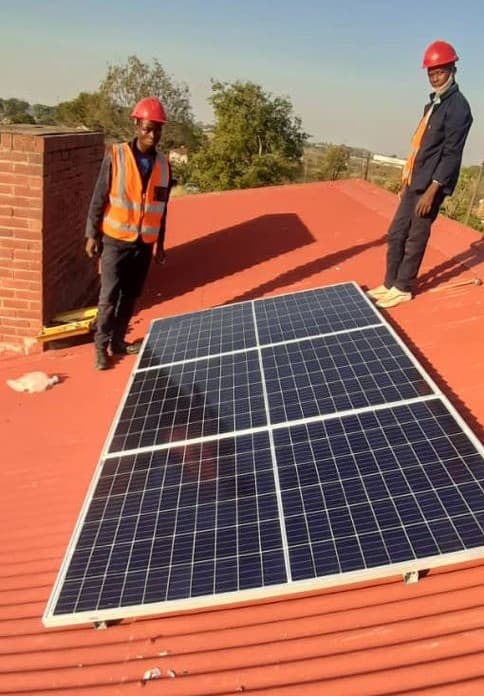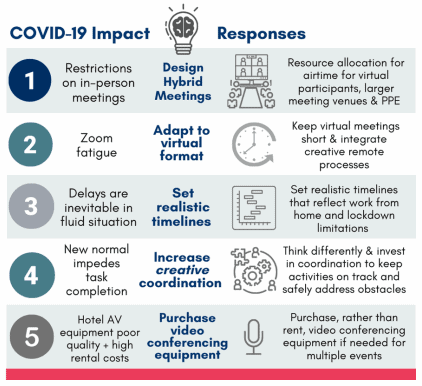Resilience & Commitment in the Face of COVID-19
December 10th, 2021 | viewpoint
Over the last year, Africa University (AU) in Zimbabwe has overcome obstacles presented by COVID-19 to implement five tuberculosis (TB) commitment grants (TCGs) provided by the USAID-funded Tuberculosis Implementation Framework Agreement Project (TIFA). AU’s experience shows how strong leadership, healthy partnerships, persistence, and creativity make the difference between stalled programs and success.
Zimbabwe TB Commitment Grants (September 2021)
Zimbabwe recorded 124,581 COVID-19 cases and 4,414 deaths as of September 2021. The country experienced three serious pandemic waves between August 2020 and August 2021 leading to major lockdowns that included curfews, restrictions on store openings and shopping hours, and border closings. COVID-19 disrupts operations—including health services and management—and as much as it is a health threat in and of itself, it leaves a wake of collateral damage by reducing services and service access for other infectious diseases and health conditions such as tuberculosis.
In partnership with the National TB Control Program (NTP), Africa University started developing its grants in February 2020, before WHO declared COVID-19 a pandemic. AU began implementing the TCGs in July 2020, but COVID-19 limited progress. While all five grants faced barriers, some of the key challenges were conducting large meetings and training sessions, as well as procuring laptops and other equipment for a central-level hub and provincial facilities where health care providers could participate in virtual clinical mentorship sessions through Project ECHO.
In all, AU and the NTP had more than 20 meetings and training sessions to conduct between July 2020–August 2021. While there was hope in early July 2020 that COVID-19 would subside and activities would move forward as planned, it was clear by September 2020 that business could not go on as usual.

Restrictions on meetings, travel, and commerce caused delays for all five TCGs. Elton Mugomeri, the TIFA focal point person for AU, noted that “COVID-19 delayed implementation of all the TCGs. Only the TWG activity [2, in box above] remained largely on track.”
To overcome challenges of in-person meetings, AU quickly shifted to supporting virtual and hybrid meetings. It took the savings from the reduced number of people attending in-person meetings and purchased airtime so they could connect virtually; booked larger meeting venues where social distancing could be practiced; and bought masks and hand sanitizer for those attending hybrid meetings in person.
The change to hybrid meetings came with extra costs, such as rental of sound equipment so that people could participate virtually. Yet, as Dr. Mugomeri observed, “AU has noted that the quality of our blended [hybrid] meetings [is] suboptimal due to poor quality of sound equipment available and unreliable network. Also, the use of a wired microphone during blended meetings poses challenges.” He hopes to use wireless microphones, which facilitate social distancing, in future meetings. Most frustratingly, he added, “After renting equipment for about 10 meetings, we could have purchased our own technology.”
Trying to coordinate multiple activities while working from home under lockdown strains staff and their resources. “We needed to call everyone from personal phones, instead of office phones or emailing them. There were connectivity and technology challenges related to working from home,” noted AU’s Nyarai Mugadza.
Her colleague Mandla Tirivavi concurred. “From home you do not have access to the office phone. When you are coordinating, you are calling everyone. There needs to be a budget line for coordinators to have a communication budget.
Africa University staff went to extraordinary lengths to procure laptops, sound equipment, and solar panels to create a virtual mentorship platform connecting the NTP in Harare to provincial facilities. “During the peak of the second wave,” noted Dr. Mugomeri, “pandemic restrictions included border closures and shorter operating hours for grocery shops. All shops selling non-essential goods had to make special arrangements with customers and deliver goods to homes.”
Procurement costs increased due to disrupted supply chains, subdued industrial production, and disruptions in global supply chains. “AU needed to procure video conferencing equipment, furniture, and solar power backup systems—items whose demand increased due to a surge in virtual meetings. As a result, procurement of equipment was delayed for months,” added Dr. Mugomeri. When shops closed, AU staff drove around Harare copying telephone numbers in shop windows and calling merchants to set up special meetings to discuss purchases and obtain price quotes.

AU is integrating lessons from the last 12 months into the design of additional grants to address TB in Zimbabwe. “COVID-19 remains a serious challenge. Teams who are able to adapt operations can face the challenge,” said Dr. Mugomeri. The AU and NTP teams’ strong leadership, coordination, and commitment allowed them to continue activities despite the multitude of COVID-19-related challenges.
We strive to build lasting relationships to produce better health outcomes for all.